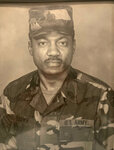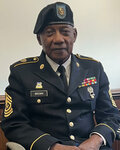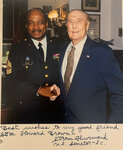




“I was sitting in the yard, playing and I [saw] him walk there with that suit on and that was me. That was me. I mean, right then. I wanted to be a soldier. That was it.” At only eight years old, Sergent Major Howard Brown predicted what would be his life’s work after watching his cousin, home from Germany to visit family, stroll in, wearing his Army uniform.
Born in Paxville, South Carolina in 1946, Sergent Major Brown was the 9th child out of 13 to parents, Deacon Jack and Minnie Brown. Deacon Brown was a generous farmer who raised hogs and
planted sweet potatoes to give to his neighbors. Mrs. Brown was equally kind and, together, the couple set an excellent example for their children. The Brown children were taught to be polite, respectful, and follow directions from their elders. Brown explains that adapting to military life was never a problem for him because he was raised “in the right way.” He credits his father for his work ethic, watching him wake every day at 4 a.m. to tend to his farm, home, family, and community.
“On Father’s Day, I get to the church, and I always say, the man that’s down in that cemetery is the greatest man I’ve ever known. No ball players or nothing like that. My father was the greatest man I ever knew,” Brown stated.
Brown graduated from Manning Training High School in 1964, after attending Paxville Elementary School as a child. As graduation neared, Brown had the opportunity to attend West Point, who was recruiting minorities heavily at the time, as well as a chance to go to the University of South Carolina and Clemson.
Brown considers that he could have been an officer or even a general if he attended a four-year university, but “that was not me … I was going into the military.” Brown was adamant on entering the Army immediately upon graduating.
After boot camp, Brown received orders for Vietnam. Instead, he was stationed in Germany in a last-minute change of orders. While in Germany, he was ordered again to Vietnam, but just three days before shipping out, was told to stay. Later in his career, the same twist of fate would occur during the Persian Gulf war, and Brown stayed put after receiving orders to head overseas. Deacon Brown had his own ideas why the Sergent Major was kept out of harm’s way. Brown explains that his father said it was God above.
“That He had something planned for me. I guess teaching at school was the thing,” Brown explained.
After an initial three years in the Army, Brown was discharged and returned home. He was an audio- visual aide at the high school and was married in 1969. Shortly after their union, Brown reenlisted and served another 23 years in military intelligence, specializing in Morse Code. Brown took a moment to pause and credit his wife, Clara, “for everything.” She raised their six children, four girls and two boys, while he was stationed overseas and unable to be home for extended periods of time. Their children are all college graduates and Brown insists he “couldn’t have done anything without her.”
After retiring from the Army in 1992, Brown was certified to teach Junior Reserve Officers’ Training Corps. He worked at the post office for about a year while actively seeking a position at local high schools. At the time, Secretary of State Colin Powell expanded JROTC programs across the United States.
Brown ended up interviewing at and receiving offers at five different schools. In 1993, he chose Elloree High School, currently Lake Marion High School after merging in 2005 and is still there today, teaching consecutively for 31 years.
“Everybody thought I was crazy. ‘You’re going to teach high school kids? They’re not soldiers. They’re not going to listen to you.’ And that’s true. They’re not soldiers.” Brown shares that he’s always been a people person and liked working with his soldiers, not managing from above. “My soldiers didn’t work with me out of fear, they worked with me out of respect.”
He explains that he treated everyone as an individual, not someone to talk down to or curse at. Because of this natural ability to lead compassionately, transitioning from working with soldiers to teaching teenagers wasn’t a stretch for Brown like it was for other veterans. “That’s why I teach 9th graders. I want to get them right out of middle school when they’re still fresh and impressionable.”
A career highlight for Brown, and a testament to his teaching abilities, was in 1995, when Brown wrote to then Senator Strom Thurmond to request his students be considered for Senate Page positions. Pages worked in Washington D.C. for one month, attending school in the mornings and working in the office in the afternoons. Brown didn’t expect an answer because he assumed large donors received the coveted spots. However, Senator Thurmond’s secretary responded to Brown and over a period of 5 years, the Sergent Major sent 35 high school juniors to intern as Senate Pages. Thurmond thanked Brown by writing a letter to the Times-Democrat, retelling how humble and hard-working the JROTC students from Elloree were. Thurmond asked to meet Brown after sending such great students to work for him and in 1999, Brown traveled to D.C. with two students to introduce himself to the senator.
Even today, Brown is still close with students after they’ve graduated. Brown proudly discusses students such as Kimberly Broughton, whom he taught at LMHS and graduated in 2012. Broughton lives in Charlotte and recently traveled to Orangeburg for a Veteran’s Day ceremony specifically to see the Sergent Major. She gifted Brown with a photo of them on her high school graduation day and then a second photo of her and Brown after she received her PhD last year. It’s students like this that keep Brown teaching at 77 years old. In fact, retirement would seem like a given to a man with a such a long, productive career. However, when asked, Sergent Major Brown just gives a sly “I’m thinking about it,” as if he knows he still has more to give.